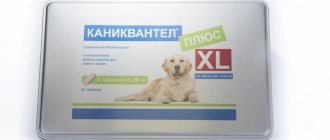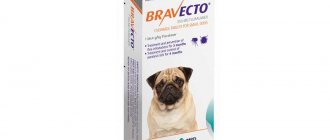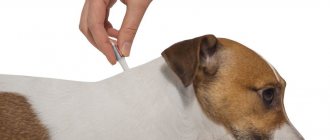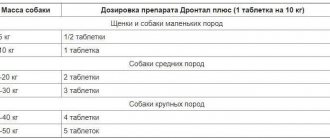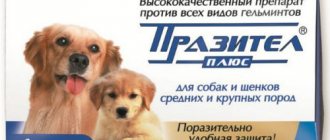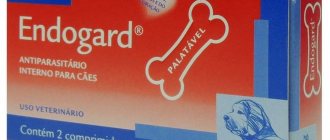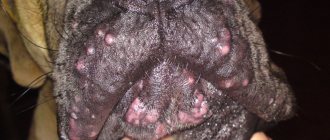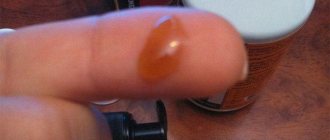The owner is always happy to see his pet healthy, active and cheerful. Without constant monitoring of the dog’s health, without a sensitive attitude, this will be impossible.
To prevent the internal state of the pet, Cestal will help, which prevents the body from becoming infected with parasites. Worms have a negative effect on the animal. The dog experiences apathy, loses appetite, and weight also decreases. If you follow the instructions, Cestal will not harm the animal, but will have a preventive effect.
Should I take it for worms?
Cestal for dogs is an anthelmintic that does not have a mutagenic effect and does not have embryotoxic properties. You can determine whether or not a dog has worms by its condition. Presence of parasites:
- vomit;
- disruption of the gastrointestinal tract;
- weight gain stops or, conversely, it begins to decrease;
- lethargy;
- apathy;
- poor appetite.
All of these signs indicate that tapeworms or roundworms have settled in the dog’s body. Cestal causes paralysis in worms, which leads to their death.
Contraindications
The drug should not be used if:
- increased sensitivity of the body to any component of the drug;
- past acute illnesses;
- chronic diseases in the acute stage;
- recent stress;
- The animal is up to 3 weeks old.
If pregnancy is planned, the drug should be taken before it. There are no direct contraindications to the use of the drug during pregnancy, but it is better to postpone deworming to a later date.
Composition of the drug “Plus”
The drug is available in the form of small round tablets of gray-yellow color. They have a dividing strip, which owners of small breeds will appreciate. The weight of one tablet is 700 mg.
Active substances in the composition of the drug:
- Fenbendazole. The amount of substance per tablet is 200 mg. It has a strong effect on nematodes. Parasites die quite quickly. The substance is absorbed in the intestine and excreted very slowly during bowel movements or in the urine of the animal.
- Pyrantel pamoate. The amount of substance per tablet is 144 mg. Pyrantel is a broad-spectrum anthelmintic that kills various types of nematodes. The substance causes paralysis in the worms and they die. It is absorbed in the intestines and is excreted from the body along with feces for a long time, providing a long-lasting effect of the drug.
- Praziquantel. The amount of substance per tablet is 50 mg. Praziquantel has a detrimental effect on cestodes (tapeworms in dogs). The substance is absorbed immediately into the blood and has a rapid effect. Parasites die from paralysis. It is eliminated from the body within 24 hours.
- Flavoring.
The composition of the deworming tablet is three-component. Each substance has its own detrimental effect on parasites and is eliminated from the body at different rates.
Release form
Cestal Plus for dogs has one release form - tablets. One tablet weighs 700 mg. The tablets are round, with a dividing groove, light, yellow-gray. Each tablet is sealed in a foil blister. Packaged in 2 tablets in one blister. Boxes contain 5 blisters and 10 tablets.
Note! Each box comes with instructions. The box contains the following markings: name, purpose, manufacturer, short instructions, number and series, expiration date.
Dosage in tablets
Cestal is given to animals for prophylactic and therapeutic purposes, to remove cestodes and nematodes from the body. The drug is available in tablet form, so the dose is calculated based on the weight of the animal. Before use, be sure to read the instructions and follow them carefully.
Medicine dose:
- puppies – one fourth tablet (175 mg);
- small breed dogs up to two kilograms – one fourth tablet (175 mg);
- from 2-5 kg – half a tablet (350 mg);
- from 5-10 kg – one tablet;
- from 10-20 kg – two tablets;
- from 20-30 kg – three tablets;
- from 30-40 kg – four tablets;
- over 50 kg – five tablets.
For prevention, treatment is carried out once. If the animal is heavily infected with worms, the tablet is given again after a couple of weeks.
Prevention is allowed to be carried out once every three months. The drug has no side effects. It is prohibited to use it together with other anti-parasite products.
Indications and contraindications for use
Cestal Plus is prescribed for the treatment of helminths of all types. Once every 3-6 months the drug is used to prevent infection. More often, the medicine is prescribed by a doctor, but the presence of worms can be determined by the lack of appetite, the depressed state of the animal, weight loss, itching in the anus (the dog scratches the anus on the floor). It is mandatory to take tablets before breeding and vaccination.
It is forbidden to take tablets together with other anthelmintics.
Cestal Plus should not be given to puppies under 3 weeks of age, female dogs in the last weeks of pregnancy, or dogs weakened after surgery. To identify individual intolerance to the drug, you should undergo a preliminary consultation with a veterinarian.
How to give?
The drug should be given during the morning feeding. There are several ways to offer medicine to your dog:
- Hide the tablet in the food.
- Mix the medicine with minced meat or other treats and offer it to the dog.
- Force the animal to swallow the pill. To do this, the drug is placed on the root of the tongue and the pet’s mouth is closed. He has no choice but to obey.
- Grind the tablet and dissolve in warm boiled water. Draw the solution into a syringe and inject it into the dog’s mouth.
Prevention and treatment do not require any preparation. The dog does not need to be kept on a diet, given an enema or given laxatives.
Storage conditions
To maintain the effectiveness of the drug, it is important to maintain the storage conditions recommended by the manufacturer:
- Store the drug in the manufacturer's box, it protects from direct sunlight.
- Do not open individual packaging until immediate use.
- Store Cestal in a dry place with a relative humidity of no more than 60%.
- Storage temperature range from 5 to 20 degrees.
- Store Cestal out of the reach of children and animals, away from food and feed.
If the recommended storage conditions are observed, the shelf life of the drug is 2 years from the date of production.
If it gets bad
Be sure to follow the instructions and do not exceed the dose of the drug indicated therein. If a dog feels bad, you can tell by its condition:
- poor appetite;
- diarrhea;
- vomit;
- apathy.
Immediate veterinary intervention is required.
An allergic reaction to the drug is possible. If it occurs, the veterinarian prescribes symptomatic treatment and antihistamines.
For dogs with high sensitivity to medications, deworming should be given with caution; it is better to consult a specialist before doing so.
Content
1. Composition and types of release 2. Pharmacological effects 3. Indications and contraindications for use 4. Dosage for dogs 5. Price 6. Reviews
Cestal Plus is an anthelmintic drug that is used only for dogs; the medication variation is not suitable for cats. The medicine was developed by French scientists and is currently produced in Hungary. The main advantage of the medication is its extensive effect on parasites located in the pet’s stomach and intestines. Cestal Plus is able to fight nematodes, cestodes and other varieties of tapeworms and annelids.
Due to their broad effects, the tablets can be used without a veterinarian's prescription. If you follow the dosage indicated below, they will not harm or cause discomfort to your pet. In case of an overdose, vomiting, diarrhea, depressed state of the animal, and lack of appetite are possible. Intoxication is very dangerous for dogs, so it is necessary to immediately rinse the stomach.
Carefully studying the instructions for use of Cestal Plus for dogs will protect you from critical situations.
Reviews
Owners
Alena, owner of a one-year-old male.
“One friend gave us a puppy. We immediately noticed that he had digestive problems; his tummy was always upset. They started trying to introduce other foods into the diet, but nothing helped. We decided to show it to a specialist. They took tests and it turns out the puppy just had worms.
Treatment was prescribed, but the condition did not improve. We changed the drug to Cestal. After some time, they took the test again, and it showed that there were no more parasites. Now, knowing about this problem, we carry out prevention every three months.”
Vadim, the owner of the beagle.
“We often relax in the village. One day we returned home, and the dog began to behave strangely. She fell into a state of apathy and began vomiting. He refused his favorite walks and took him to the clinic. Tests showed the presence of parasites. I didn’t even think that they could affect the dog’s condition so much.
The clinic recommended Cestal. Since I noticed larvae in the feces, after a couple of weeks the treatment was repeated and now my dog is healthy. I recommend this drug."
Alexandra, owner of a Labrador.
“Before mating or vaccination, I always give this drug to my dog. We have to force her to swallow. She doesn't like the smell of the pill. Tests were taken at the clinic and parasites were never found. We are glad".
Veterinarians
Oksana, 4 years of work experience.
“I am pleased with this drug, I like its wide spectrum of action. It is suitable for both prevention and treatment. I usually also prescribe Enterosgel. Substances still pass through the liver, it is better to remove them immediately. Cestal has no side effects, unless, of course, you exceed the dose.”
Andrey, owner of a veterinary clinic.
“Cestal is an imported drug that works well against parasites. Its price, of course, is not small, but it does its job perfectly. During my practice, there have never been cases where anyone complained about its effectiveness or asked to replace the drug with another. Do not forget that any remedy for worms is poison , do not exceed the recommended dose.”
Tatyana Valerievna, veterinarian.
“I always prescribe this drug to my furry patients, I have never had any complaints. In my opinion, this is the most effective remedy among others.”
Analogs
As analogues, veterinary pharmacies can offer the following drugs:
- Drontal. , Germany. The composition of the remedy for flat and roundworms includes pyrantel, praziquantel, febantel;
- Enwire. , Ukraine. Complete analogue of Drontal. The shelf life, unlike cestal, is 4 years. The manufacturer prescribes side effects in more detail (vomiting, diarrhea, etc.);
- Pratel. Manufacturer: Lek Pharmaceuticals, Slovenia. Contains pyrantel and praziquantel;
- Holiday plus. Manufacturer: Haupt Pharma GmbH, Germany. There are two active bases: fenbendazole and praziquantel. The developers did not prescribe side effects or contraindications for the drug, but introduced an aromatic additive. The smell of meat makes it much easier for your dog to eat the tablet.
I ask veterinarians for advice
Food for thought……..
Prevention of helminthiasis in dogs.
All animals, including domestic ones, are susceptible to infection with helminths (worms). Even companion dogs (Yorkies, Chihuahuas, Toy Terriers) that never go outside can be infected with helminths. Infection can occur through worm eggs brought into the house on the owners' shoes, carried by fleas that can migrate throughout the premises, and also occur in utero and even through mother's milk (1). Animals whose diet includes raw meat, fish and offal are at increased risk of infection. Worms are very easily transmitted from animals to humans, so you should strictly observe the rules of personal hygiene, you should not allow your dog to “kiss” you, and you should definitely limit the dog’s contact with small children. We recommend that you consult with a pediatrician and decide whether you need to give your child anthelmintic prophylactically, or you can limit yourself to just observing the rules of personal hygiene. Preventive deworming in dogs should be carried out every 3 months (once a quarter). Be sure to carry out preventive deworming 10 days before vaccination and 2-4 weeks before mating. It is not recommended to use anthelmintic drugs for pregnant animals (especially in the first half of pregnancy) and puppies under 3 weeks. The use of anthelmintics for therapeutic purposes varies greatly depending on the type of helminth and the composition of the particular drug. Most often, twice the use of the drug is required with an interval of 10-14 days. To select the correct medications and prescribe treatment, you must contact a veterinary clinic. In cases where the animal has a helminthic infestation, there are worms visible to the naked eye in the feces, or the dog is vomiting worms, treatment for worms must be carried out under the supervision of a doctor. Since the rapid death of helminths leads to severe intoxication, detoxification therapy will definitely be required. Puppies suffer more severely from worms, young dogs suffer slightly less, while in adult animals, helminthic infestation can be asymptomatic! Have your dog's feces tested in a laboratory at least once a year. Remember that it is possible to detect worms in feces with the naked eye, even with severe infestation, only in isolated cases (mainly eggs or larvae, as well as dead parasites or their mature segments, are excreted with feces). Let us briefly consider the drugs that are used for the prevention and treatment of helminthiases. Almost all drugs that are used today for the prevention of worms have a complex effect (they affect various types of helminths, and not only helminths). According to the method of application, anthelmintics can be divided into drops and collars for external use, tablets and suspensions for oral administration, and injectable preparations. All these drugs are toxic and therefore are strictly calculated based on the weight of the animal. Do not exceed recommended doses.
Cutaneous preparations.
Lawyer (Bayer HealthCare AG, Germany.)
Advocate contains imidacloprid (10%) and moxidectin (2.5%) as active ingredients, as well as auxiliary components (benzyl alcohol, propylene carbonate, butylated hydroxytoluene). Advocate has a wide spectrum of antiparasitic action, is active against larval and mature phases of development of intestinal nematodes and larval forms of Dirofilaria, demodectic and sarcoptic mites, fleas, lice and lice. Advocate is used by animals by drip (“spot-on”) application to dry, intact skin in places inaccessible to licking, between the shoulder blades at the base of the neck. The minimum therapeutic dose of the drug for dogs is 0.1 ml/kg of animal body weight (10 mg/kg imidacloprid and 2.5 mg/kg moxidectin). To deworm animals with nematodes of the gastrointestinal tract, the drug is used for therapeutic purposes once, and for prophylactic purposes - once a month. Advocate is prohibited from being used on puppies under 7 weeks of age, patients with infectious diseases, and convalescent animals. Bars spot-on (LLC NEC "Agrovetzashchita S.-P.", Russia) Bars spot-on contains ivermectin and praziquantel as active ingredients, as well as auxiliary components. Bars spot-on is highly effective against round and tape helminths, insects, sarcoptic and demodectic mites. Bars spot-on is applied only to dry, intact skin of the animal in doses of 0.15-0.2 ml per 1 kg. the weight of the animal at several points inaccessible for licking (at the base of the skull, between the shoulder blades, along the back). For nematodes and cestodes for therapeutic purposes, the drug is applied once. The maximum therapeutic effect is observed 4–5 days after application. For preventive purposes, deworming is carried out once a quarter. The use of Bars spot-on in bobtail, collie and sheltie dogs is not recommended. Pregnant and lactating females, as well as animals with infectious diseases and convalescent animals, and puppies under 8 weeks of age are not subject to treatment. You should not pet or bathe the animal or allow it near small children for 24 hours after using the drug. IN-AP complex (IN-AP complex) (OOO NPK SKiFF, Russia.) Antiparasitic drug in the form of a solution for external use, containing 1 ml as active ingredients 4 mg of aversectin C1, 50 mg of fipronil and 100 mg praziquantel, as well as auxiliary components: benzyl alcohol, propylene glycol and dimethyl sulfoxide. IN-AP complex has high anthelmintic and insecto-acaricidal activity against round (including larval forms of heartworms) and tapeworms, intermediate and mature phases of development of fleas, lice, lice, and ixodid ticks. IN-AP complex destroys round and tape helminths - within 48 hours after use. Use by drip application to dry, intact skin, spreading the animal's fur, in the back area between the shoulder blades, at the base of the skull - in places inaccessible for licking. Dosage 0.1 ml per 1 kg. It should not be administered to puppies under 2 months of age, pregnant or lactating females, patients with infectious diseases and convalescent animals, as well as other antiparasitic drugs. It is not recommended for collie, sheltie and bobtail dogs due to their increased sensitivity to avermectins. Do not wash, pet or allow the animal near small children for 24 hours after treatment with the drug. Prazicide-complex (NPF Api-San LLC, Russia.) Prazicide-complex drops contain ivermectin, praziquantel, levamisole, diphenhydramine, as well as auxiliary components as active ingredients. Dosage according to the table is approximately 0.4 ml per 2.5 kg. Prazicide complex is a combination of antiparasitic agents that have a detrimental effect on all stages of development of nematodes and cestodes, sarcoptic and demodectic mites and other insects. Apply the drug by spreading the animal's fur at several points that are inaccessible for licking (at the base of the skull, between the shoulder blades). Puppies younger than 8 weeks of age, as well as animals with infectious diseases and convalescent animals cannot be treated. For preventive purposes, deworming is carried out at least once a quarter. For nematodes and cestodes, the drug is prescribed twice with an interval of 10-14 days. After treatment, you should not pet the animal or allow it near small children for 24 hours, or bathe it for the first 4 days. Stronghold (Pfizer Animal Health, USA.) Stronghold contains selamectin as an active ingredient. Selamectin has a wide spectrum of systemic antiparasitic effects on nematodes, insects and sarcoptic mites. Stronghold has a detrimental effect on the larvae of round helminths and also has ovicidal properties. The drug does not affect sexually mature nematodes. The drug is applied directly to the dry skin of the animal between the shoulder blades at the base of the neck. Stronghold is prescribed once, and the dose per active substance is 6 mg of selamectin per 1 kg of animal weight. Stronghold is used for therapeutic purposes once, and for preventive purposes - monthly. It is prohibited to use stronghold on puppies under 6 weeks of age, patients with infectious diseases and convalescent animals. It is not recommended to wash, pet or allow the animal near small children for 2 hours after treatment with the drug. Collar against internal and external parasites for dogs (Rolf club, Russia.) A unique complex collar for constant wear, protecting against both external and internal parasites. The active ingredient is IVERMECTIN 1.15%, as well as auxiliary components: polymer (Sevilen), citronella oil and SKP-US dye. Effective against roundworms (nematodes), ticks, fleas, lice, lice, and also prevents diseases caused by them. Protection against helminths (nematodes) for up to 2 months. Protection against ticks for up to 2 months. Flea protection for up to 4 months. The collar should not be used by patients with infectious diseases, lactating and pregnant females, puppies under 8 weeks of age, or simultaneously with other insectoacaricidal agents. PS. Despite the absence of contraindications from the manufacturer, I do not recommend the use of this collar on bobtail, collie and sheltie dogs.
Oral preparations.
Pills . ALBEN S (LLC NVC "Agrovetzashchita S.-P.", Russia.) A tablet weighing 0.6 g contains 25 mg of azinox and 250 mg of albendazole. Alben S has a wide spectrum of anthelmintic action on all stages of development of round and tapeworms. Prescribed for prophylactic and therapeutic purposes for nematodes (toxocariasis, toxascariasis, uncinariasis, hookworm disease, trichuriasis) and cestodiasis (dipilidiosis, echinococcosis, diphyllobothriasis, mesocestoidosis and other taeniasis) in dogs and cats. Alben S is given to animals once, individually in the morning feeding with a small amount of food (water) or is administered forcibly to animals weighing 2.5 kg or more, at the rate of 1 tablet per 5 kg of animal weight. For cats and small dogs, 1 tablet is crushed, suspended in 10 ml of water, shaken vigorously and immediately administered internally to the animal using a syringe without a needle, at the rate of 1 ml of suspension per 0.5 kg of animal weight. For preventive purposes, animals are dewormed quarterly at the above dose. Alben S should not be used by lactating or pregnant females, puppies under 3 weeks of age and kittens under 3 months of age. Azinox plus (LLC NEC "Agrovetzashchita S.-P.", Russia.) Azinox plus is a complex anthelmintic drug intended for deworming dogs with nematodes and cestodiases. 2. The drug contains as active ingredients: azinox (50 mg per tablet) and tetramizole hydrochloride (70 mg per tablet), as well as auxiliary components: glucose and potato starch. Azinox Plus has a wide spectrum of anthelmintic action on all stages of development of round and tapeworms. Azinox plus is given to dogs once, individually in the morning feeding with a small amount of food, or it is administered forcibly at the rate of 1 tablet per 10 kg of animal weight. Azinox Plus should not be used by pregnant or lactating bitches within 10 days after birth, or by puppies under 3 weeks of age. Dirofen (NPF Api-San LLC, Russia) Dirofen is a broad-spectrum anthelmintic drug for the treatment and prevention of diseases caused by nematodes and cestodes. Contains pyrantel, fenbendazole and excipients. Intended for the prevention and treatment of diseases in kittens and puppies caused by tapeworms and roundworms (Toxocara, Uncinaria, Hookworm, Tenia, Dipylidia, etc.). Used once, starting from 3 weeks of age, 1 tablet per 1 kg of weight. The tablets are given forcibly or with a piece of a favorite treat, or crushed, suspended in 2 - 5 ml of water, shaken thoroughly and immediately given to the animal directly on the root of the tongue from a syringe without a needle. For preventive purposes, deworming of kittens and puppies is carried out at the age of 2, 4, 8, 12 weeks, and then at the age of 4, 5 and 6 months. Do not use in animals under 3 weeks of age. Should not be used in pregnant bitches during the first two thirds of pregnancy. Dehinel Plus (KRKA, Slovenia.) Dehinel Plus contains febantel, pyrantel embonate and praziquantel as active ingredients, as well as auxiliary components. Dehinel Plus has a wide spectrum of anthelmintic action and is destructive for round and tapeworms. It is used for the prevention and treatment of dogs with nematodes (toxocariasis, toxascariasis, uncinariasis, hookworm and trichuriasis) and cestodoses (echinococcosis, dipylidia, taeniasis, multiceptosis, mesocestoidosis). Dehinel Plus is administered orally to dogs individually, once in a mixture with food or directly on the root of the tongue at the rate of 1 tablet per 10 kg of animal weight. Preventive deworming should be carried out 3-4 times a year, as well as before vaccination and mating. It is prohibited to prescribe Dehinel Plus to puppies under 3 weeks of age, to female dogs in the first two thirds of pregnancy, as well as to animals suffering from infectious diseases and convalescent animals. Dosalid (Farmasierra Manufacturing SL / Farmasierra Manufacturing S. El., Spain) Dosalid contains pyrantel (in the form of pamoate) and epsiprantel, and lactose monohydrate and microcrystalline cellulose as auxiliary components. Dosalid has a wide spectrum of anthelmintic action against nematodes and cestodes. The drug is administered orally at the rate of 10.5 mg of active ingredients per 1 kg of animal weight. The first preventive deworming of puppies is carried out at the age of 2 - 4 weeks and then every 4 weeks until they reach the age of 6 months, and then after 6 months. For lactating females, preventive deworming is carried out 2 weeks after the birth of puppies, and then at intervals of 2 weeks until weaning. It is recommended to deworm lactating females and puppies at the same time. Adult animals undergo regular preventive deworming twice a year from 6 months of age annually. When treating infestation in adult animals, repeated deworming is carried out after 7 - 14 days Drontal plus (Bayer HealthCare AG, Germany.) Drontal plus contains 50 mg of praziquantel, 144 mg of pyrantel embonate and 150 mg febantel, as well as excipient. Drontal Plus has a wide spectrum of anthelmintic action on all stages of development of roundworms and tapeworms. Drontal plus is administered orally to dogs individually, once at the rate of 1 tablet per 10 kg of animal weight, in the morning feeding with a small amount of food. For preventive purposes, dogs are dewormed quarterly, as well as before vaccination and mating. Caniquantel plus (Maramed Pharma GmbH, Germany) 1 tablet contains: Praziquantel - 50.0 mg; Fenbendazole - 500.0 mg; Fillers. The drug is used orally for mixed helminthiasis in dogs caused by round and flatworms. The dosage is 5 mg of Praziquantel and 50 mg of Fenbendazole per kg of body weight, which corresponds to 1 tablet of Kanikquantel Plus per 10 kg of body weight. For current (preventive deworming) it is recommended to repeat treatment with Canikquantel Plus every 3 months. In case of particularly severe infection, the dosage is repeated. When infected with roundworms - especially in young dogs - a single application may not be enough for complete deworming, which can lead to the possibility of infection of people who are in close contact with the animals. Therefore, in case of ascaris infestation, treatment with Kanikvantel Plus should be repeated after 2-3 weeks. Do not use in pregnant animals. Milbemax (Novartis Sante Animal SAS, France) Milbemax tablets are administered orally to dogs at the rate of 0.5 mg of milbemycin oxime and 5 mg of praziquantel per 1 kg of animal weight with a small amount of food. Prescribed to dogs for preventive and therapeutic purposes for nematodes (toxocariasis, toxascariasis, hookworm disease, trichuriasis) and cestodiasis (taeniasis, echinococcosis, dipylidiasis, mesocestoidosis). And also for the prevention of dirofilariasis in regions where Dirofilaria immitis is registered. It is prohibited to administer Milbemax to animals under 6 weeks of age, in the first two-thirds of pregnancy, as well as to animals suffering from infectious diseases and convalescent animals. Polyverkan (Ceva Sante Animale, France) Polyverkan is an anthelmintic drug containing 40 mg of oxybendazole, 200 mg of niclosamide and an excipient. (Niclosamide is effective against flatworms and oxybendazole is effective against roundworms). Polyvercan is used in dogs for the prevention and treatment of toxocariasis, toxascariasis, uncinariasis, hookworm disease, dipylidiasis, diphyllobothriasis. A sugar cube is fed to dogs from the owner's hand or added to food (water). 1 sugar cube per 10 kg of animal weight. In case of severe infestation, treatment must be repeated after 10 days. For therapeutic purposes, it is given twice with an interval of 10 days, for prophylactic purposes, once a quarter. Deworming of kittens and puppies is carried out from the age of thirty days. Prazitel Plus (NPK SKiFF LLC, Russia) 1 tablet contains: pyrantel pamoate - 140 mg, praziquantel - 50 mg, fenbendazole - 100 mg. Prescribed for therapeutic and prophylactic purposes for nematodes, cestodes and mixed nematodo-cestodes infestations, in the following doses: 1 tablet per 10 kg of body weight. The drug is administered individually, once, in the morning feeding with a small amount of food. With a high degree of infestation, deworming is repeated after 10 days. For preventive purposes, the drug is used in dogs once every 3 months. For lactating bitches, the drug is prescribed 2 to 3 weeks after birth. The drug should not be used by pregnant bitches. Prazicide for dogs (NPF Api-San LLC, Russia) The drug is prescribed to animals for prophylactic and therapeutic purposes for diseases caused by round and tapeworms: nematodes (toxocariasis, toxascariasis, uncinariasis, hookworm) and cestodiasis (tenidosis, dipylidiasis, echinococcosis, diphyllobothriasis, mesocestoidosis). Prazicide is prescribed to dogs for preventive and therapeutic purposes in the following doses: 1 tablet per 10 kg of animal body weight. The drug is given to animals individually, ONCE, in the morning feeding with a small amount of treat (in a piece of sausage, meat, with minced meat, etc.). If an animal refuses food containing an anthelmintic, PRASICID is administered forcibly to the root of the tongue or in the form of an aqueous suspension using a syringe without a needle. No preliminary fasting diet or use of laxatives is required. For preventive purposes, animals are dewormed quarterly in the above doses, as well as 2 weeks before the intended vaccination. Prazicide should not be used in puppies under 2 weeks of age or in pregnant females during the first half of pregnancy. Pratel (Lek Pharmaceuticals dd, Slovenia.) 1 tablet contains 144 mg of pyrantel embonate and 50 mg of praziquantel. Pratel have a wide spectrum of anthelmintic action on larval and mature forms of nematodes and cestodes. The tablets are administered orally whole or in crushed form with food or forcefully on the root of the tongue in the following doses: for kittens and dogs weighing up to 2 kg - ? tablets, cats and dogs weighing from 2 to 5 kg - ? tablets, dogs weighing from 5 to 10 kg - 1 tablet, dogs weighing from 10 to 20 kg - 2 tablets, dogs weighing from 20 to 30 kg - 3 tablets, dogs weighing from 30 to 40 kg - 4 tablets, dogs weighing from 40 up to 50 kg - 5 tablets. The drug is administered once. Pratel can be used on puppies and kittens from 30 days of age. For preventive purposes and to avoid infection with helminths in people (especially children), deworming of dogs and cats is recommended 3-4 times a year, as well as before vaccination and 2-4 weeks before the expected mating date. Pratel should not be used by pregnant or severely malnourished animals. Trianthelm (Intervet Schering-Plough Animal Health, Netherlands) Trianthelm contains in 1 tablet as active ingredients 560 mg of oxantel pamoate, 145 mg of pyrantel pamoate and 50 mg of praziquantel, and corn starch as excipients , lactose, microcrystalline cellulose, magnesium in the form of stearate. The drug is effective against nematodes (toxocariasis, toxascariasis, uncinariasis, hookworm disease) and cestodiasis (taeniasis, dipylidiasis, echinococcosis, diphyllobothriasis, mesocestoidosis). Trianthelm is given to animals individually once, in the morning feeding with a small amount of food or forcefully on the root of the tongue or in the form of an aqueous suspension, after crushing the tablet, using a syringe and catheter. For therapeutic purposes, animals are dewormed according to indications, for preventive purposes - quarterly. Trianthelm is used in dogs from 3 weeks of age. Trontsil , (NPO NARVAK, Russia) One tablet contains 50 mg of praziquantel, 144 mg of pyrantel embonate and 150 mg of febantel. Trontsil is used to deworm dogs against roundworms and other nematodes, whipworms and tapeworms from 6 weeks of age. The drug is given to animals once. To prevent helminthiasis, the drug is used once every 3 months in the same dose as during treatment. It is not recommended to give it simultaneously with piperazine and is not recommended for females in the first two thirds of pregnancy. Febtal (LLC NVC "Agrovetzashchita S.-P.", Russia.) The active ingredient is 5-phenyl-thio-2-benzimidazole carbamate. Febtal has a detrimental effect on all stages of development of nematodes and cestodes. For puppies and cats (over three weeks of age), the drug is given individually against Toxocara, Toxascaridae, Hookworm, Uncinarium, Dipylidium, Tenia at the rate of 1 tablet per 3 kg or 1 g of granulate per 4.4 kg of animal weight once a day for three days in a row. . For dogs against toxascarids, hookworms, uncinarium, dipylidia, tenia at the rate of 1 tablet per 1.5 kg or 1 g of granulate per 2.2 kg of animal weight once. Cestal Plus (Ceva Sante Animale, France.) Cestal Plus contains in one tablet as active ingredients 50 mg of praziquantel, 144 mg of pyrantel embonate and 200 mg of fenbendazole, as well as an excipient. Cestal Plus has a wide spectrum of anthelmintic action against cestodes and nematodes. Cestal Plus is given to dogs individually, once in the morning feeding with a small amount of food (with a piece of meat, sausage, minced meat, porridge) at the rate of 1 tablet. by 10 kg. In case of severe infestation, the drug is used again after 14 days. For preventive purposes, dogs are dewormed quarterly, as well as before vaccination and mating. Do not use on female dogs in the first two thirds of pregnancy and on puppies under 3 weeks of age. Suspensions, pastes. Helminthal for dogs - anthelmintic with pumpkin oil and meat flavor 10 ml (Gelmintal) (Rolf club, Russia.) Helminthal contains pyrantel pamoate and praziquantel. Helminthal suspension is prescribed to adult dogs, as well as puppies, starting from 3 weeks of age for therapeutic and prophylactic purposes for nematodes (toxocariasis, toxascariasis, uncinariasis, hookworm, trichuriasis) and cestodiasis (tenidosis, dipylidiasis, echinococcosis, diphyllobothriasis, mesocestoidosis), as well as with mixed nematode-cestodose invasions. The drug is used individually, once, in a dose of 1 ml per 10 kg of animal weight (250 mg of pyrantel pamoate and 50 mg of praziquantel per 1 kg of animal weight) with food. If the animal refuses to feed with the drug, the Helminthal suspension is forcibly administered to the root of the tongue using a dispenser syringe. In case of severe infestation of animals, deworming is repeated after 10-14 days at the same dose. A preliminary starvation diet and the use of laxatives before deworming are not required. For preventive purposes, animals are dewormed quarterly. Pregnant females are dewormed in the second half of pregnancy, lactating females - 3 weeks after birth with caution under the supervision of a veterinarian. Helminthal suspension should not be used in puppies under 3 weeks of age, in pregnant females during the first half of pregnancy, or simultaneously with anthelmintics containing piperazine. Dironet suspension (Suspensio Dironetum) (LLC NVC "Agrovetzashchita S.-P.", Russia.) Dironet suspension contains ivermectin, pyrantel pamoate and praziquantel as active ingredients, as well as auxiliary components. Dironet suspension has a wide spectrum of anthelmintic action on all stages of development of round and tapeworms and on larvae (microfilariae). For nematodes and cestodes of the gastrointestinal tract, Dironet suspension is given to animals orally once individually at the rate of 1 ml of suspension per 1 kg of animal weight in the morning feeding with a small amount of food or administered directly to the root of the tongue using a dispenser. For preventive purposes, animals are dewormed in a therapeutic dose quarterly, as well as before vaccination. Should not be used by pregnant and lactating females, puppies under 3 weeks of age, as well as animals suffering from infectious diseases and convalescent animals. For collie, sheltie and bobtail dogs, Dironet suspension should be used under the supervision of a veterinarian. Dirofen paste (NPF Api-San LLC, Russia) Ingredients: Praziquantel, pyrantel pamoate, pumpkin seed oil, auxiliary components. Dirofen paste is prescribed to dogs for prophylactic and therapeutic purposes for nematodes (toxocariasis, toxascariasis, uncinariasis, hookworm) and cestodiasis (tenidosis, dipylidiasis, echinococcosis, diphyllobothriasis, mesocestoidosis). Dirofen paste is administered to dogs ONCE, orally, individually in the morning feeding with a small amount of food, or is administered forcibly using a dosing syringe without a needle at the rate of 1 ml per 3 kg of animal body weight. For therapeutic purposes, deworming of animals is carried out according to indications. In case of severe infestation, it is recommended to repeat the treatment after 10 days. For preventive purposes, adult dogs are dewormed in a therapeutic dose quarterly. Pregnant females are dewormed in the second half of pregnancy, lactating females - 3 weeks after birth with caution under the supervision of a veterinarian. Dirofen paste should not be used by pregnant females during the first half of pregnancy, or simultaneously with anthelmintics containing piperazine. Piradek suspension (Piradek) (LLC NVC "Agrovetzashchita S.-P.", Russia.) Piradek contains pyrantel pamoate and sodium ribonucleate as active ingredients, as well as auxiliary components. Piradek suspension has high antiparasitic activity against round helminths. Piradek suspension is administered orally once individually using a dispenser syringe (or with a small amount of food) at the rate of 1 ml of suspension per 1 kg of live weight. Preventive deworming is carried out once every three months. Should not be used by puppies under 3 weeks of age, patients with infectious diseases or convalescent animals. Prazitel suspension (LLC NPK SKiFF, Russia.) Prazitel suspension contains as active ingredients: pyrantel pamoate - 30 mg and praziquantel - 3 mg, as well as auxiliary components. Prazitel suspension has a wide spectrum of antiparasitic activity against round and tapeworms. The suspension is set for animals inside once individually at the rate of 1 ml of suspension per 1 kg of animal weight in morning feeding with a small amount of feed or introduced directly to the root of the tongue using a dispenser. For deworming animals, with a weight of less than 1 kg, the amount of the drug is calculated as 0.1 ml per 100 g of dog mass. With a high degree of invasion by helminths, prasitar suspensions are set again after 10 days. Preventive deworming is carried out quarterly and 10 days before vaccination. The females in the first half of the puppy and feeding up to the 3-week period after childbirth, puppies are younger than 2 weeks of age, as well as patients with infectious diseases and recovering animals are not subject to deworming. Prasicide Sweet suspension (NPF LLC “API-SAN”, Russia) The composition is prazikantel, parantela Pamoat, auxiliary components. The drug is prescribed to animals with preventive and therapeutic purposes for diseases caused by round and ribbon helminths: nematodoses (toxocarosis, toxascaridosis, unitsinarosis, ankylostomosis) and cestosis, diphyliosis, echinococcosis, diphyllobriosis, mesotestosis). Prazicide Subsenzia is used to dogs individually, once at the rate: 1 ml per 3 kg of body weight of the animal. For therapeutic purposes, deworming of animals is carried out according to indications. In case of severe infestation, it is recommended to repeat the treatment after 10 days. For preventive purposes, deworming is on the above dose on a quarterly dose, as well as 2 weeks before the alleged vaccination. Pregnant females are dewormed in the second half of pregnancy, lactating females - 3 weeks after birth with caution under the supervision of a veterinarian. The drug should not be used for pregnant female female in the first half of pregnancy, as well as simultaneously with anthelmintic agents containing pipeperine.
Injectable drugs.
Levamisole 75 (Levamisolum 75) (Nita-Pharm CJSC, Russia.) Injection solution, 1 ml of which contains 75 mg of levamisole hydrochloride and auxiliary components. Levamisole is an anthelmintic with nematicidal action, active against nematodes of the gastrointestinal tract and lungs. Prescribed to dogs - for toxocariasis and toxascariasis, uncinariasis and hookworm. The drug is administered once, subcutaneously, at a dose of 7.5 mg/kg of animal weight (based on the active substance), which corresponds to 1 ml of solution per 10 kg of animal body weight. Weakened, emaciated and sick animals with infectious diseases, as well as females in the last third of pregnancy, are not subject to deworming. Ivermec (JSC Nita-Pharm, Russia) Injection 1% solution in 1 ml contains 10 mg of ivermectin as an active ingredient, an auxiliary component - vitamin E (40 mg), a preservative and an aqueous-organic base. It has a pronounced antiparasitic effect on the larval and mature stages of nematodes of the gastrointestinal tract and lungs, larvae of subcutaneous, nasopharyngeal, gastric botflies, lice, bloodsuckers and sarcoptoid mites. Ivermek is administered to dogs intramuscularly in compliance with the rules of asepsis at the rate of 0.2 ml of the drug per 10 kg of animal weight (200 mcg of active substance per 1 kg of weight). Animals that are weakened, exhausted, or sick with infectious diseases, as well as females in the last third of pregnancy, should not be treated. Apply to dogs no more than 2 times with an interval of 10 - 14 days, and the dosage of Ivermek should be carefully observed. Collie and Sheltie dogs are especially sensitive to the drug, which can result in death! !!! Regarding the selection and use of drugs for the prevention and treatment of helminthiasis, we recommend consulting with a veterinarian. For proper dosing, be sure to weigh your dog and carefully read the instructions for use. !!! (1) For example
Ascaris - Toxocara canis . A dog becomes infected when it ingests parasite eggs. Further in the digestive tract, the larvae are freed from the egg shell, penetrate the intestinal wall, enter the liver through the intestinal veins, and from there through the blood flow into the heart and lungs! There the larvae grow and then go to the bronchi, from where they move to the trachea and enter the oral cavity with sputum, and then, along with food or saliva, they are swallowed and make their way to the small intestine, where they grow and turn into mature helminths. The worst thing is that some of the larvae enter the systemic circulation and are carried by the blood flow to various tissues and organs (liver, lungs, brain, heart, skeletal muscles, walls of the gastrointestinal tract). Of course, here they cannot complete their development cycle and become sexually mature. But they do not die, but go into a state of suspended animation. In puppy dogs, three weeks before giving birth, the “dormant” larvae become active and migrate into the fetuses. So, almost all puppies are born already infected with Toxocara! And even this is not enough - the larvae continue to migrate throughout the body of the whelping female during lactation! Some of them reach the mammary glands, and subsequently infect puppies sucking milk. Others reach the bitch's intestines, where they grow into adult worms and give birth to new offspring.
Side effects from using the product
Before giving your dog Cestal, you need to determine the list of side effects from using the drug. And prepare for symptomatic therapy - reactions to the medicine occur and manifest themselves quite quickly, so the owner will have to provide first aid to the dog. The most common reactions to Cestal Plus are:
- loss of appetite and refusal to eat in general;
- skin manifestations of allergies, local hair loss;
- diarrhea and other disorders of the excretory system;
- vomiting and nausea;
- refusal of contact with owners, games, or even unmotivated aggression.
We must remember: side effects from Cestal can affect not only dogs, but also people. Toxic substances contained in the medicine can cause allergic reactions.
To avoid them, use gloves and wash your hands after using the product. And at the first signs of an allergy, consult a doctor.
Price and similar means
One tablet of Cestal costs about 80 rubles. In regional pharmacies you can find offers for about 50 rubles. Consequently, for a package of 10 tablets the buyer will pay about 500-800 Russian rubles. The exact cost depends not only on the company that sells the medicine, but also on the distance from the border.
If the price seems too high, you can choose an analogue. All products closest in composition to Cestal are three-component. The only difference between them is the proportion of each. They are called:
- Trontsil.
- Drontal.
- Helminthal.
Which tablets are better to use: conclusions
What are the best drugs to use, given the huge variety of all options (we didn’t talk about all of them in the article)? In fact, there is not much variety, and this is easy to see. Once again reading the above descriptions of the drugs, it is easy to see the low variety of active ingredients.
In fact, we are talking about three or four titles. So in many cases the same remedies are hidden under different names. Again, this is easy to verify by looking at the absolutely identical active ingredients and dosages of the drugs described in the article.
Remember! You should not choose a medicine by its name. We will also warn you once again that it is not worth giving antiparasitic drugs to dogs just like that, for the sake of “prevention”.
First, we strongly advise you to consult a veterinarian, since the choice of a specific drug should be based on the results of a stool examination and identification of the specific type of parasite. This is due to the fact that the same drugs are suitable for the treatment of cestodiases and ascariasis, while completely different drugs are required to eliminate trematodes.
Giving a dog medicines for ascariasis when its liver is full of opisthorchids is a useless activity and harmful to the health of the pet.
The conclusion is simple: many drugs, having the same substances in their composition (at similar concentrations), differ little from each other. Therefore, you should choose medications not according to the principle of “better” or “worse,” but according to their effectiveness against certain types of parasitic worms.
